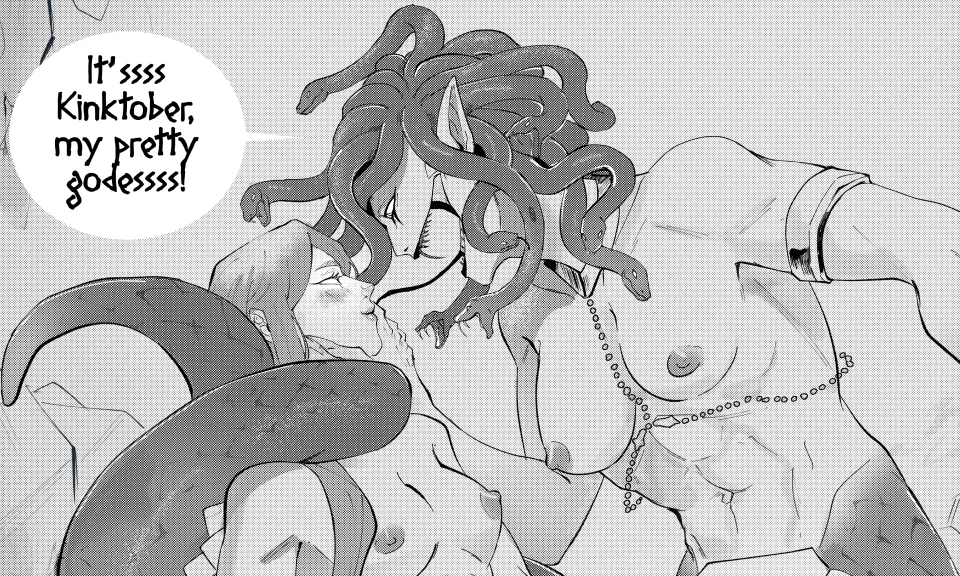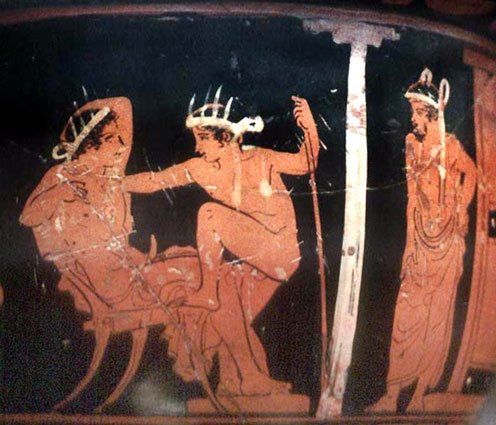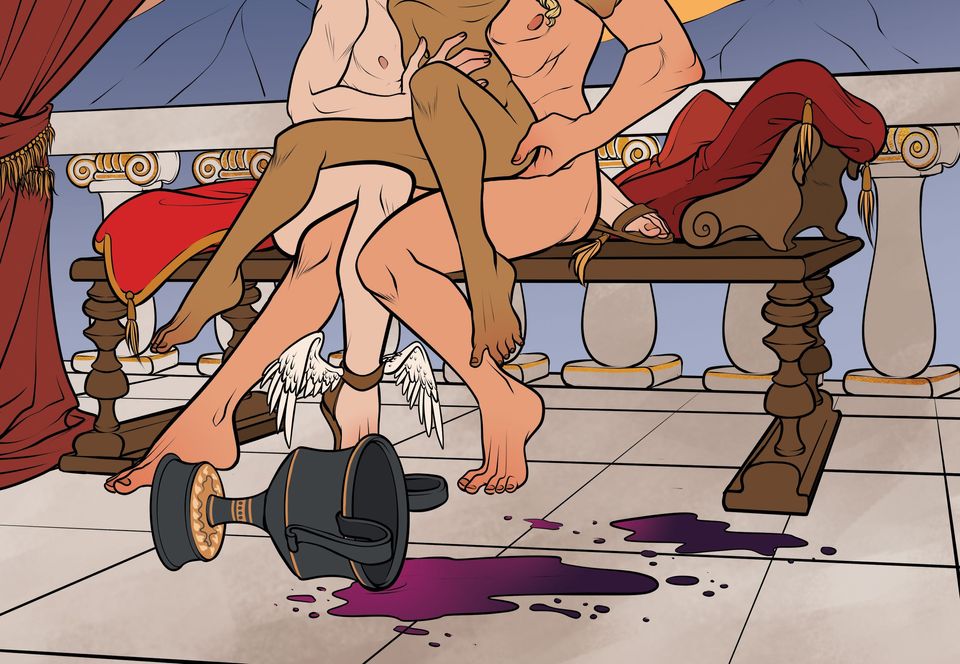Fiction: Sons of Zeus (Dionysia Submission)
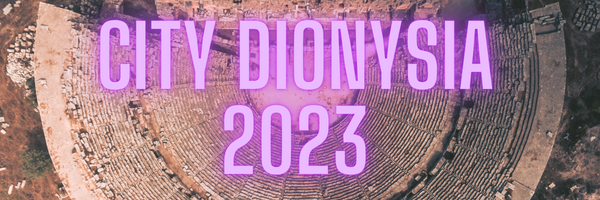
Hello my lovelies,
this is my submission for the online Dionysia this year, a competition in the spirit of the City Dionysia in ancient Athens. I've been wanting to write an adaptation of this particular myth for a few years but I never got around to it. Since I wrote this piece over the course of like two days to meet the deadline, Dionysos deserves better but I was the only one submitting a retelling this year so I won by virtue of being the only contestant. Yay?
If y'all like the idea, I would like revisiting this story and expanding upon it, maybe with some sexytime. Let me know 💖
Glossary
Argos: a city in the Peloponnese, Greece and one of the oldest continuously inhabited cities in the world. As a strategic location on the fertile plain of Argolis, Argos was a major stronghold during the Mycenaean era and a major cult centre of Hera where Hera Argeia was a champion of heroes.
Bakkhos: better known in its latinised form Bacchus, a name and epithet of Dionysos. His followers are therefore called Bacchants.
Diktys: a fisherman who took in Perseus and his mother Danaë and helped raise Perseus.
Eos: Goddess of Dawn
eromenos: the younger partner in the traditional same sex relationship between an adult erastes and a youthful eromenos. The relationship was supposed to end after the eromenos could grow a full beard. But there were couples staying together well after the fact.
Evoe! an exclamation of Bacchic frenzy
harpē: a sickle sword, notable in Greek mythology for being the weapon that castrated Ouranos and Medusa was also beheaded by a harpē, possibly the same one since Perseus received it from the gods. In this vase painting, Athene presents the harpē to Perseus.
Perseus: was conceived by his mother Danaë through Zeus turning into a shower of gold, making him a half-brother of both Hermes and Dionysos, as well as many, many gods and demi-gods. He is famous for slaying the gorgon Medusa in an effort to save his mum from the advances of King Polydektes. In Nonnos' version of events, he is still in possession of the Head of Medusa. According to Astronomica 2.12 Hermes loved him.
thyrsos: a staff of giant fennel topped with a pine cone and decorated with ivy vines and leaves, sometimes wound with colourful tainiai (ribbons). It was carried during Hellenic festivals and religious ceremonies and is tightly associated with Dionysos and his retinue.
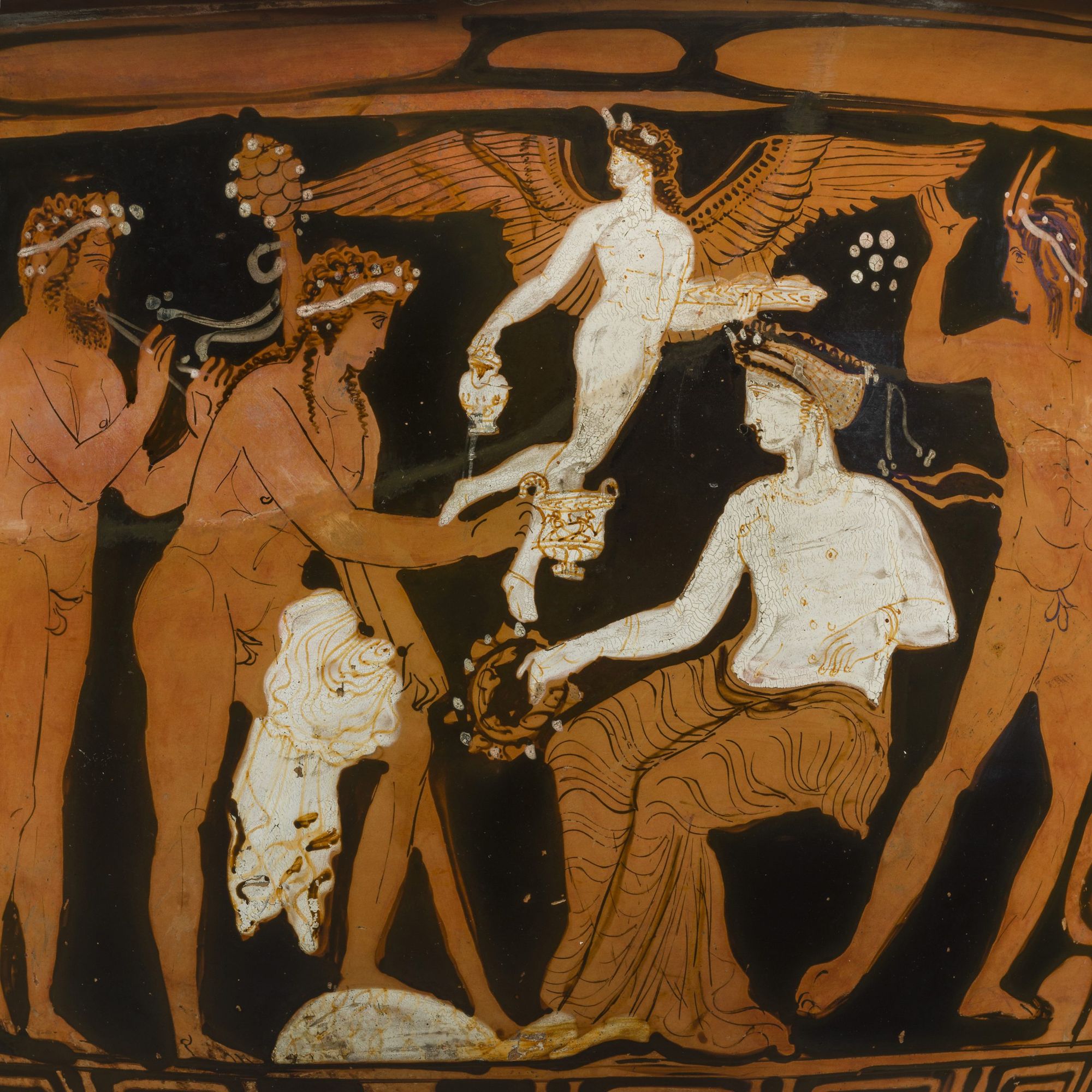
Sons of Zeus
Adapted from the Dionysiaka Vol 47 by Nonnos of Panopolis
There it was: the city of Argos lay before them on the fertile plain of Argolis. Dionysos closed his fist tighter around his thyrsos. It was one of the major cult centres of Hera. This was her land. If she would strike him with madness again for bringing his cult to her city? His eyes darted nervously from the distant walls to the sky, watching for his brother Hermes. He had promised to bring news from the Argives. Ariadne squeezed his hand.
"He'll come."
And he did. Swift like the winds that carried him, the messenger of the gods appeared as a dot against the white clouds but he rapidly came closer until he landed by their side, inclining his head in greeting. Dionysos embraced his brother.
"What news do you bring?" he asked anxiously.
"Don't worry," Hermes reassured him, giving his ruddy cheek a caress, "The King of Argos is a son of Zeus like you and I. Kinship alone should open these gates in friendship."
"Has our father ordered him to receive us as guests?"
"Not exactly."
"What makes you so sure, then?"
Hermes opened his arms in a self-aggrandising gesture.
"I know everyone."
"I just..." Dionysos sighed. "We have been met with so much hostility. At every new place it's another struggle."
Hermes swooped him up in his open arms.
"I know. But listen, brother: I am certain of my judgement. I know King Perseus incredibly well. He has a kind heart."
Dionysos rested his head on his brother's shoulders. He was so very tired of the constant struggle. But without a cult, he wouldn't be allowed to join the gods on Mount Olympos and all his suffering would have been in vain. Perseus. He knew that name.
"Your eromenos?"
"You know what? I will personally announce you." Hermes gave him a kiss and took to the air again. "If that isn't worthy of a young god, I don't know what is."
💨 💨 💨
Perseus startled when Hermes came rushing in through an open window.
"Hermes! I did not expect a visit from you so soon!" He turned to his advisors, servants, and suppliants. "Leave us."
Hermes waited until they were alone before he kissed his lover. Nobody needed to know that their relationship had not ended after Perseus grew his first beard.
"I'm not here for my pleasure alone," he said, his arms still affectionately wrapped around Perseus, "I bring an important message."
Perseus frowned.
"What is it? Important messages are rarely good news."
"This one is. Have news of Dionysos or Bakkhos reached Argos yet?"
"I don't think so. Who is he?"
"A brother. A son of Zeus."
Perseus shrugged.
"Our father has many sons. What business does this Dionysos have with me?"
"He is on a mission." Hermes absent-mindedly played with Perseus' hair. "Father has promised him ascension to Olympos to join the immortal gods if he succeeds in establishing a cult for himself."
Perseus snorted.
"Oh did he?"
"Yes. I hope that you will welcome him to your city, help him on his quest."
Perseus broke off from the embrace.
"And why should I do that, Hermes? It's not like Zeus ever offered me immortality or a place among the gods. The people of Argos already have a son of Zeus, worthy even of Hera. I am right here. They don't need Dionysos. These gates will remain closed!"
"Perseus, come on!"
"No! My father is Diktys for all I'm concerned. I received divine aid on my foolish quest for the head of Medusa. I am forever grateful for that. But did Zeus take any interest in me beyond this folly of my youth? No. So I won't take any interest in his plans for his other sons."
Hermes frowned. Perseus wasn't wrong. Their father had nurtured Dionysos in his thigh for three months while Perseus had been cast out in a wooden chest with his mother, facing the open sea all by themselves. But should the aspiring wine god be punished for being favoured thus?
"Are you not the least bit curious to meet him?"
"No. And if that's all you're going to talk about, please leave. I have to tend to my kingdom."
"You are inviting retribution if he does get deified. Maybe even if he doesn't. He has powers, Perseus."
"I will deal with that problem once it presents itself."
"Don't be like that, sweetness. We should all help and support each other, don't you think?"
"No means no, Hermes! You don't get to sweet-talk me on this. Leave me alone."
"All right." Hermes climbed the window. "I understand that you are hurt. I won't say it's not justified. But you misdirect your anger."
Perseus said nothing, turning his back on him.
🍇 🍇 🍇
"I'm sorry," Hermes told Dionysos, "The gates of Argos will not open for you."
"Oh."
Dionysos looked crestfallen. Ariadne stroked his back. They had been met with resistance in so many places, it was easy to see why. Hermes had hoped that at least Perseus would welcome the fledgling god. But for once, he had misjudged his lover.
"Better to move on to Mycenae and Korinth."
"No. Argos is too important." Dionysos shook his thyrsos. "If the king wants a fight, I will bring it to him."
Ariadne gave Hermes a worried glance.
"Are they strong, the Argives?" she asked.
"Yes. And Perseus bears the most deadly weapon of them all."
"The head of Medusa," Dionysos whispered.
"Exactly. It's not worth the risk, brother."
Ariadne spoke again:
"But if Lord Zeus deems our quest a failure because Argos is missing, the proud city of Hera, all of our efforts will have been for nought."
"Ariadne is right." Dionysos' soft face grew grim. "We attack at dawn."
"You are making a mistake, brother."
"That may be so. But what choice do I have? I have lost too much already to turn my back on Argos."
⚔ ⚔ ⚔
And so rosy-fingered Eos was witness when the heavy bronze spears of Argos clashed with the ivy and deadly fennel of the Bacchants, when Perseus, wielding his harpē, the sickle sword with which he had beheaded Medusa, was driven back by the fury of Dionysos and his Evoe! crying retinue. The Argive warriors fled before the army of women but their king returned on swift feet, holding a heavy knapsack. With loud voice he addressed his men:
"Tremble not before only one snake wreathed in the hair of these women, when my harpē reaped such a harvest as the vipers of Medusa!" And with those words he lifted up the dreadful head of the gorgon which no eyes may see without paying the ultimate price. "It's nice to see you there, Dionysos, marching against me armed with your wretched foliage, playing at war. If you truly have the blood of Zeus in you, show your breeding!"
Everywhere around Dionysos his Bacchants were gasping as they beheld the severed head of the gorgon, turning to stone immediately, life-like statues silent and unmoving on the battlefield. Ariadne, armed with the thyrsos Perseus had mocked, was not saved by the armour she had lovingly been girded in. Her eyes went dull and her limbs stiffened as she gazed upon the wreathing vipers of Medusa. Within a heartbeat she was gone, only a likeness of stone in place of the living, breathing woman. Dionysos cried in rage and grief, tears stinging in his eyes.
"Perseus! I will never surrender until I show Argos your throat pierced by my spear of ivy and your sword beaten by my leaves!" he roared in his pain, "Zeus my father will not save you, nor Athene my sister, nor Hera of Argos, however much she hates me! But I swear I will kill you, and the Argives shall see beheaded the man who beheaded Medusa."
He was about to command his remaining retinue to charge at the enemy when Hermes appeared behind him on his winged sandals and pulled him into an embrace, stroking his long, dark hair and tried to calm him with friendly words and avert the ruin his two brothers wreaked upon each other:
"Dionysos! Brother! This is madness! Your sweet bride, still breathing of love a moment ago, now takes her love to the grave. Come now, lay down your thyrsos, let the winds blow battle away, and bury your wife in peace here in Argos, where the image of heavenly Hera stands. I promise you, brother, she will be seen every night on the star-spangled sky near Maia, my mother, among the seven travelling
Pleiads. What could Ariadne wish more than this glorious fate of dying in battle, slain by the greatest hero alive? She lives in the heavens, giving light to the earth, until you can follow."
He embraced him and kissed the tears away as they kept coming.
"Will you allow me to make peace?" he asked.
"Yes," Dionysos replied weakly, "I yield to you but not to him."
"That is good enough for me."
Hermes squeezed him before racing across the battlefield, avoiding the deadly countenance of Medusa. When Perseus saw him approach, he quickly shoved the ghastly head back into the sack.
"Hermes!"
"For the love you bear me, Perseus, end this fratricidal war and make peace."
"Why should I? I have him defeated."
"And what a feat that is." Hermes gestured at the Bacchants before them, half of them turned to stone, the other half weeping. "An army of women armed with ivy and fennel. Truly a deed worthy of song for generations to come. Make peace, Perseus, invite this brother you never knew into your city in friendship. You are not so different. Even if she is now all stone by your reckless hand, Dionysos saved Ariadne when she was left behind by her lover, sleeping on the sands beside an empty sea, Perseus, while you loosened the chains of Andromeda when you saw her in peril and offered the stone seamonster as a worthy bridal gift. Come, give sacrifice to Bakkhos and Zeus, and make amends to please this god's heart."
Both Argives and Bacchants gathered together and struck up a song with nightly rites for Dionysos: the tambours rattled, the feet beat the ground, the torches blazed. Altars were red with bulls slaughtered in rows, one after another. And as the sacrifice burnt, Perseus and Dionysos made their peace, casting their deluding fury to the winds.
FIN
If you enjoy my writing and want to support me, sign up here or become a patron at Patreon.
